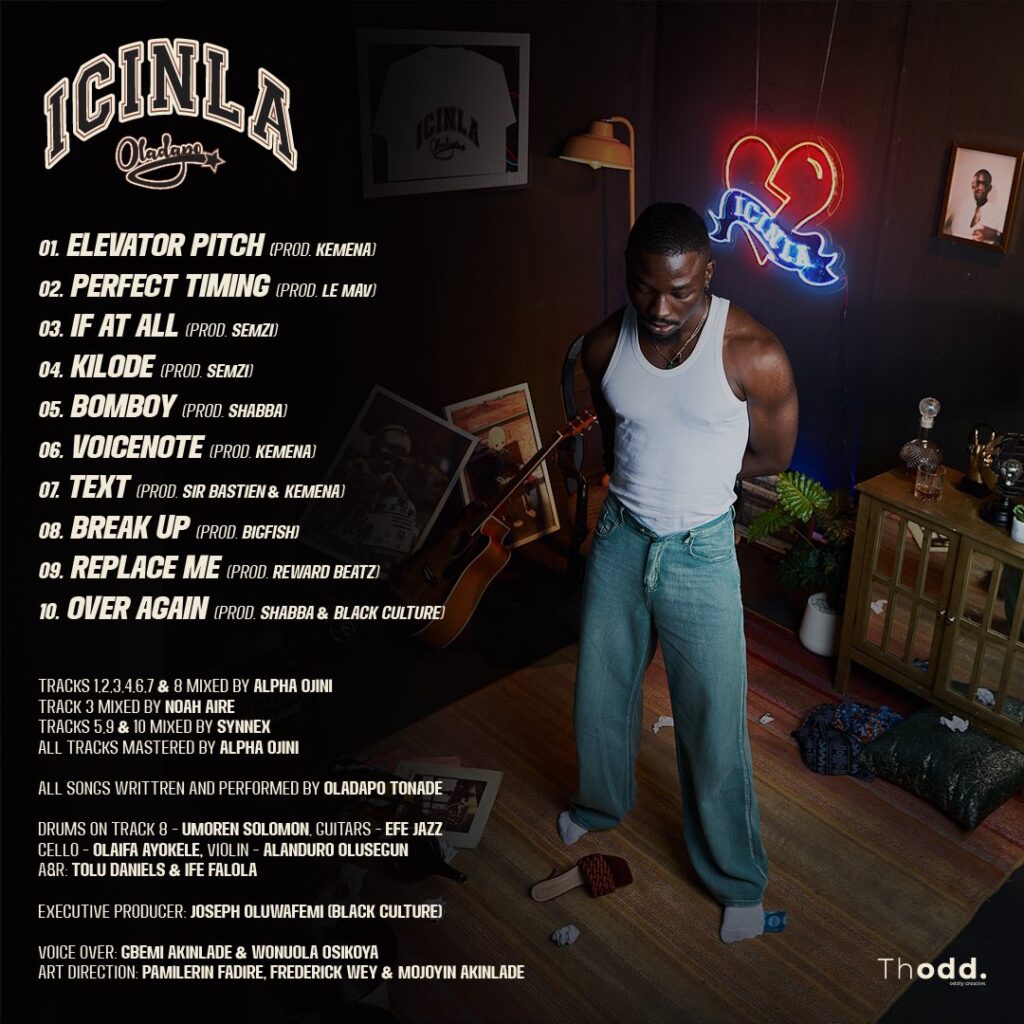In Case I Never Love Again is an expository on Oladapo’s love-cum-heartbreak experience. It is a relatable project to anyone who has been in the murky waters of love…
By Emmanuel Daraloye
Last month, the Grammy Awards listed Nigerian singer and songwriter, Oladapo, as one of Afrobeats’ rising stars. The University of Lagos student has been on a semi-hiatus from music, but notwithstanding, his ingenuity has placed him in the revered awarding body’s spotlight. And after months of forgivable silence, the singer makes a dashing return with his debut album, In Case I Never Love Again. With such a confrontational title, Oladapo takes us through his battle with love, trust, insecurity, and other peripheries of relationships.
Oladapo Adetunji Tonade, better known only by his first name, officially kicked off his career in 2018 by consistently posting freestyle videos on his Instagram page, amassing a dedicated audience. In 2019, his debut single, “Mango“, was shortlisted by Mr. Eazi’s music initiative, emPawa Africa. But it was “Gbe Bodi”, his hit single released the same year, that caught the attention of fans and music critics alike. Oladapo’s unusual blend of Afrobeats, RnB, and Highlife is usually magnified by his usage of the Yoruba language and Nigerian pidgin, and his depth and vulnerability set him apart from his contemporaries. He brings all these to the forefront with his new project, In Case I Never Love Again.
The album opens with an intro, “Elevator Pitch,” a forty-two-second conversation that interpolates lines from his 2021 single, “Isakaba”. This intro serves as a meeting point between Oladapo and a persona he created, as they interact in an elevator. This introduction continues into the next track, “Perfect Timing”, where the artiste confesses, “For the first time that you walk into my life, I don’t know what I did”. His honeyed vocals highlight this mid-tempo track, as he expresses admiration for a girl and he admits her hold on him. The production is deliberately kept moderate, which allows Oladapo’s words to have a grander effect on the listeners.
(Read also: Life Is Better Now Review: Nana Fofie Tells an Emotive Story With Her EP)
“If At All”, the Amapiano-inflected standout tune finds Oladapo in a new zone. It is an experimental track that ticks all the boxes. The song serves as the lead single on this album, with the track accumulating close to three hundred thousand views on YouTube. Here, the artiste takes stock of his trajectory with his lover. Even though their relationship began by chance, he is open to possibilities in the course of their romantic voyage.
While the term “Based On Logistic” – which describes a current situation/constraint– may be ascribed to the Big Brother Naija season 2 winner, Efe Money, Oladapo expounds it further on “Kilode”. Here, the singer is in a vulnerable state, as he questions his girl’s faithfulness while asking if any other would love her as he does.

In street terms, the word ‘Bomboy’ means a lover-boy or a ‘simp.’ When Oladapo begs to be a girl’s bomboy, it becomes obvious things are out of place: “The love I get for you is not ordinary,” he claims on “Bomboy”. The light guitar-pivoted track is rife with vocal samples that sometimes hinder the song from being properly heard. The second voice conversation on the album appears on “Voicenote” where an apprehensive Oladapo delivers a voice note to his love interest. Here, a love-struck Oladapo is short of the right words to express his thoughts, but through his muddled speech, he makes his intentions clear.
On “Text” Oladapo sings of his fallout with a girl. Her refusal to take his call forms a large chunk of the message in this song. On the guitar-filled track, he sings about his relationship woes: “Every little second, I have been looking at my phone”, he paints in the first verse, confessing about second-guessing reaching out. The mid-section reaffirms the one-sided relationship, as Oladapo decides to move on.
The moody track “Break Up” suggests that the artiste is in his most vulnerable state. Finally, he gets closure. While it is difficult to admit his shortcomings, he reasons that it is the right thing to do. He also goes on a tirade about his challenges with his romantic partner. He sings of her disrespect and unfaithfulness, among many things.

(Read also: Ru The World Review: Ruger’s Sugary Debut Album Promises a Gratifying Experience But Nothing More)
A bright saxophone kicks off “Replace Me”. With moody vocals, the track gives off a more sombre feeling as Oladapo sings about letting go. He takes on the journey to self-worth as he offloads all excess baggage. The album ends with gratitude, and there is finally respite for Oladapo on “Over Again”. This song comes off as something created in the aftermath of a breakup, as he admits to his insecurities and opens up about his shortcomings.
In Case I Never Love Again is an expository on Oladapo’s love-cum-heartbreak experience. It is a relatable project to anyone who has been in the murky waters of love. Oladapo sequentially arranges this story, following a stylish laid-down pattern, starting with optimism and ending on a pessimistic note. The album is a rollercoaster of emotions with negative feelings taking the bulk of the project.
This debut is an offering to his fans, who get a glimpse of his artistry via a full-length project. It is also a great come-back after a two-year lull. There are instances where his words are inaudible, but beyond that, this project is still a commendable effort. With promising songwriting, Oladapo proves that his success so far is not a fluke and that it is no mistake that he has been named one of the heirs of Afrobeats music.
Lyricism – 1
Tracklisting – 1
Sound Engineering –1
Vocalisation – 1
Listening Experience – 2
Rating – 6/10
Emmanuel Daraloye is Africa’s most prolific freelance music critic. He has over 600 album reviews in his archive.




